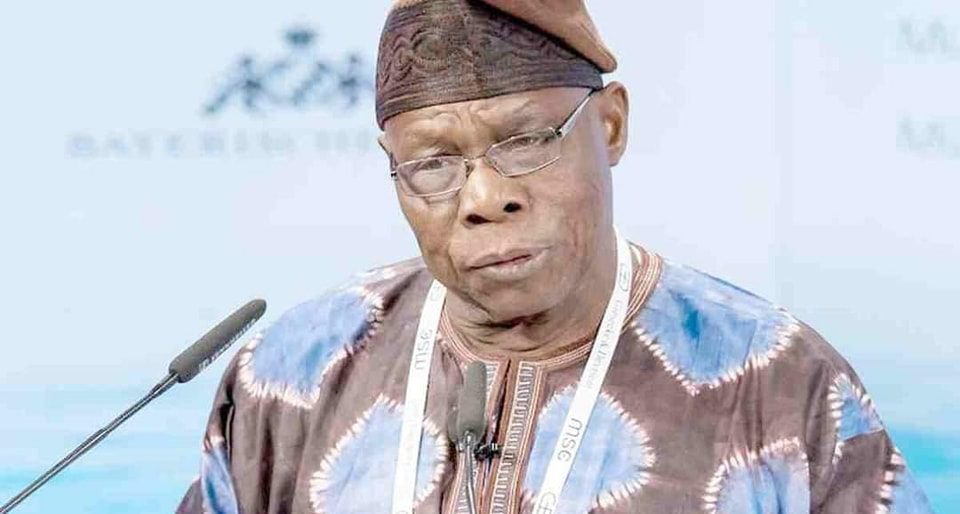Headlines
Obasanjo: Nigeria’s Youth Joblessness Like a Keg of Gun Powder

Nigeria’s former president, Obasanjo, speaks out about the dangers of youth unemployment, describing it as a ticking time bomb.
The elderly statesman’s position is in response to the nationwide #Endbadgovernance protests led by young people who are expressing their discontent with hunger and adversity within the country.
Expressing his concern over the restlessness of young people due to unemployment, former president Olusegun Obasanjo is afraid that Nigeria could be sitting on a highly volatile situation.
During an interview with the Financial Times that Channels Television monitored, Obasanjo declared this.
He issued a warning stating that our young people are agitated due to their lack of skills, empowerment and job opportunities. As a result, the situation resembles sitting on an explosive keg. He prays fervently for us to take appropriate measures before it’s too late.
The experienced statesman’s position arises in response to the continued national protests by young people under #Endbadgovernance, who are protesting against hunger and adversity within the country.
Since August 1, protests carried out by young people throughout the country have escalated with various reports and occurrences of thefts and violence being documented.
Obasanjo added that Nigeria’s economy could have been significantly improved if it had not solely depended on the production of crude oil.
According to him, the country’s dependability on crude oil was a fatal error.
He stated that depending solely on oil was a fatal error, as we placed all our eggs in one basket. Despite having the vital resource of gas at hand, it was being wasted through flaring.
The inability of the Nigerian National Petroleum Company Limited (NNPCL), as well as other national and International Oil Companies, to increase oil production and fulfill the country’s demands.
According to Obasanjo, instead of relying heavily on crude oil as a source of investment, Nigeria should have placed more focus on investing in agriculture.
“Agriculture, which could have been the focus of our investment, was overlooked.”
The ex-president subsequently discussed why Nigeria’s four refineries have failed to operate despite significant investments and efforts to reconstruct them.
He remembered his attempts to convince Shell to operate the nation’s refineries, but was rebuffed by the International Oil Company because of their concerns about rampant corruption in the industry.
“When I served as president, I extended an invitation to Shell to acquire equity and oversee the operations of our refineries. However, they declined on account of poor maintenance and lack of qualified personnel in charge. Consequently, corruption became rampant within the system leading them not wanting any part in such a chaotic environment,” he explained.
He expressed disapproval of the government’s approach to revive the refineries.
“Numerous times we have been assured that the government refineries would be repaired and at what cost. However, those problems remain unresolved and have even worsened over time. As long as these obstacles persist, progress will not be made.”
According to him, individuals profiting from the profitable enterprise of importing fuel will endeavor to obstruct Dangote Petroleum Refinery.
In response to claims made by Alhaji Aliko Dangote, the President of the Dangote Group, that certain “mafias” were attempting to hinder progress on the $20 billion refinery project, Obasanjo expressed his viewpoint.
If Aliko’s refinery investment is successful, it could stimulate investments from Nigerians and foreigners in Nigeria.
According to Obasanjo, the individuals who sell or provide refined products for Nigeria will put in significant effort to cause frustration if they believe that they stand to lose a profitable opportunity.
The Dangote Group officials have expressed their concern that international oil companies are obstructing the refinery’s progress by either denying them access to crude or offering it at a surcharge of up to $4 more than its regular cost.
The Nigerian Midstream and Downstream Regulatory Authority were also accused of intentionally issuing licenses for importing contaminated fuel to certain individuals.
Dangote diesel was rejected by the regulator as it was deemed inferior in comparison to imported alternatives.
Farouk Ahmed, the Chief Executive of NMDPRA, clarified that despite Dangote Group’s dominance in the fuel industry, importation of fuel would not be halted.
The ex-president criticized President Bola Tinubu’s approach towards eliminating fuel subsidies, asserting that the current government should have prioritized assessing potential suffering caused by subsidy removal and finding ways to alleviate it.
According to the previous head of state, there is a substantial amount of work that needs to occur. It cannot be solved by merely waking up one morning and deciding to withdraw the subsidy since its elimination does not imply it has disappeared due inflation; instead, it resurfaces.
According to him, for Nigeria to progress, it is imperative that investors have faith; and further stated that the transition from a transactional economy towards an innovative one is necessary.
